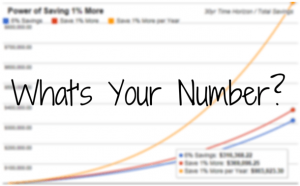 The million dollar question. Or is it two million? Either way, it’s hard to save for anything without knowing how much you need. When it comes to how much you need to retire, there’s no perfect answer.
The million dollar question. Or is it two million? Either way, it’s hard to save for anything without knowing how much you need. When it comes to how much you need to retire, there’s no perfect answer.
The answer, in its entirety, is a series of educated guesses, along with dirty math, to come up with a fuzzy number you’ll need to live off throughout retirement.
I don’t say this to discourage you. Understand, we’re predicting the future based on past averages. You’re projections need to account for: inflation, expected returns (and an asset allocation to get you there), your ability to save, and your behavior along the way.
It’s simply not a perfect science. Retirement calculators work in a vacuum, reliant on fixed numbers. The economy and the stock market don’t move in a straight line or act rationally at all times.
The Expectations
Since you can’t predict the future, you’re stuck using historical results. Here’s what we do know:
- Historical inflation runs about 2.3% (source)
- Historical stock performance is about 9.5% (source)
- Historical bond performance is about 5% (see above source)
Each one has seen extended periods where it did better and worse than the average. Expecting more than that is a stretch. Be conservative with your assumptions – expect returns of 6 to 7% annually.
Then there is time. The biggest thing in your favor, is also the biggest uncertainty. You have decades to reach this goal before retirement, but the money can’t run out before you do.
Don’t forget, life expectancy continues to rise. You might look at 95 or 100 as unattainable, but medical advances have done wonders in keeping us alive longer. Don’t short change yourself on your age limits. If everything works out perfectly, you’ll have enough money to live the retirement you want with money leftover.
Of course, retirement calculators start these assumptions with your current income. Your income is a poor place to start. It’s the case of what you have versus what you need.
Right now, your income covers costs you won’t have in retirement. You won’t have to save for retirement once you reach it, no college to save for either (the kids are out by then), and the mortgage is paid off.
Here’s a better question. How much do you currently spend? If your income is $100,000 but you’re comfortably living off of $40,000, which number is your goal?
Instead, start with your current expenses, then you can drop any costs you know you won’t have in retirement and add a cushion to be safe. We do this because, it’s a hell of a lot easier to save for the $40k you happily live off now, than to amass the money pile for the $100k you don’t need. And if, you’re outspending your current income, you need to fix it soon.
Quick And Dirty Method
How much money do you need to retire? Here’s a quick example based on the historical averages from above and someone’s spending needs.
Let’s use $40,000 in spending. If you’re expected returns on your retirement savings is in the 6 to 7% range and inflation eats about 2.3% of that, you’re left with about 4 to 5% which can be spent. Since we’re being conservative, let’s use 4%. When you take that $40,000 in spending needs and divide it by 4%, you get $1,000,000.
Conservatively, anyone who spends $40,000 in retirement needs to build up about $1,000,000 in savings. If you had outside income from something like a rental property, business, or social security, you’d subtract it from $40,000 and divide by 4% again.
You can use a retirement calculator to get similar results, Every online broker has one – with cooler charts and graphs too. But I prefer simple math.
Saving More Matters
All these assumptions still leave the door open for something to go wrong. Sure you can get lucky, but luck is a bad thing to plan for. Your real goal is to avoid the worst case scenario – outliving your savings. The best way to avoid that, and the only thing you can control, is how much you save.
Saving more money lets you be a successful failure with those assumptions. It gives you wiggle room. It increases your chance of success. You become less reliant on hitting those expected returns and inflation projections you set from the start.
Saving more money gets you to the same destination with less risks to worry about. And if you come close to hitting those assumptions, you’ll reach that destination sooner. Keep that in mind when you save up for your retirement number.
